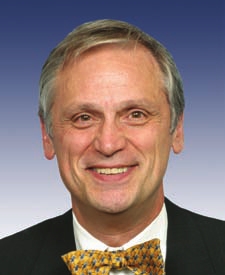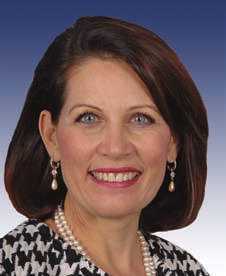Congress Reluctant to Shine Light on Transportation Earmarks
The House Transportation and Infrastructure Committee is about to unveil a massive bill that will re-authorize federal transportation programs for the next six years. The bill will also include funding for a large number of "earmarks," the congressional pet projects that can include everything from bike trails to Bridges to Nowhere.
Earmarks grew largely in the shadows until a series of pet project-related ethics scandals rocked Washington earlier this decade, helping the Democrats take control of Congress amid promises to make the process more transparent. Still, the House transportation committee is taking a looser approach to earmark openness this year: instead of requiring members of Congress to pose their earmarks early, the panel is merely encouraging members of Congress to do so.
 Rep. Earl Blumenauer (D-OR) isn’t ashamed of his earmarks. (Photo: Washington Post)
Rep. Earl Blumenauer (D-OR) isn’t ashamed of his earmarks. (Photo: Washington Post)So how can activists on the local level find out whether their local representative is backing big highways or light rail? The Sunlight Foundation, a government watchdog group based in Washington, has pored over the websites of all House members to see who followed the transportation panel’s optional deadline.
Sadly, only 83 lawmakers are letting the public see their transportation earmark requests, compared with 321 who heeded the binding transparency rule followed by the House Appropriations Committee. (The House has 435 members in total, but some swear off earmarks entirely.)
Sunlight’s list of transportation earmarkers can be found here. Rep. Earl Blumenauer (D-OR), co-leader of the Congressional Bicycle Caucus, has an impressive list of transit projects on his list. House Majority Leader Steny Hoyer (D-MD) is seeking more money for the Washington Metro’s planned Purple Line and to expand transit options for Southern Maryland.
On the flip side, two Republican members of Congress are catching some flak for their earmark requests. More on them after the jump…
Sunlight investigator Bill Allison spotted Rep. Hal Rogers (R-KY) requesting a hefty $83 million for Interstate 66 in his home district — which really should be renamed, because it’s unlikely to ever extend out of Kentucky. When a road project already has a website dedicated to its undoing, one suspects it’s not the best use of taxpayer dollars.
 Rep. Michele Bachmann (R-MN) (Photo: whorunsgov.com)
Rep. Michele Bachmann (R-MN) (Photo: whorunsgov.com)Perhaps the biggest transportation earmark story so far, however, is Minnesota’s proposal to expand its Northstar commuter rail line. The Minneapolis Star-Tribune reported on Friday that Rep. Michele Bachmann (R-MN) has declined to request earmark funding for a longer Northstar line, casting doubt on the $150 million project’s future.
Bachmann’s office told the Star-Tribune that she held off because the state DOT has yet to endorse the Northstar expansion. Yet that delay was caused by the project’s inability to meet federal cost-effectiveness standards that are long overdue for an update. Will Bachmann come around? She’s already put in a call for five road and bridge projects in her state.
Is your local representative on Sunlight’s list? If so — whether their project is good, bad, or ugly — let us know in the comments.